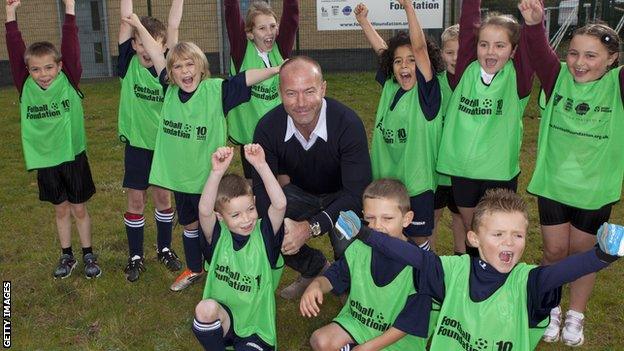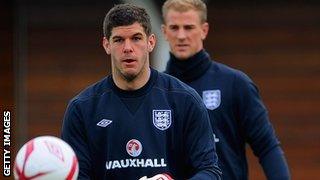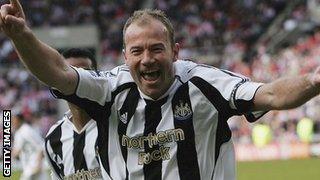Wallsend Boys Club - an institution which means more than football
- Published

Ex-Wallsend Boys Club player Alan Shearer returns to his roots
The nine smartly mown football pitches at Wallsend Boys Club rest upon the site of a former colliery - but it is footballing talent, not coal, that they mine these days.
As the Premier League wrestles once more with the issue of respect and, yet again, has to confront allegations of racism, it is in this footballing heartland that you might expect to see a pastiche of events in football's top tier.
Except, with clubs like Wallsend leading the way, there is a determination to ensure that the youngsters in their care are steered away from the negative and taught the benefits that team sport can bring.
With Alan Shearer, Peter Beardsley, Steve Bruce, Michael Carrick and Steven Taylor among the roll-call of professional players that forged their skills on the pitches at Wallsend, the club are rightly proud of their past.
But for those who guard the legacy of this north-east England institution, the future is about their greater responsibilities and not just how many of their players sign professional forms.
"The mission statement of this club is to produce good citizens," says chairman Steve Dale.
"The fact that many of those good citizens happen to be good footballers has been a phenomenal by-product."
More than a club? It is a phrase which many illustrious teams will recognise and acknowledge.
Founded in 1904 by local shipbuilder Swan Hunter to give their apprentices a place to spend their time away from work, the club survived the demise of heavy industry on the Tyne and relies now on money from its own ever-present fundraising efforts, the Football Foundation and local government.

Celtic keeper Fraser Forster is the latest Wallsend Boys Club product to break into the England squad
The youth club premises were irreparably damaged earlier this year, external and the "thick end of £1m", as Dale puts it, is needed to rebuild the much-used facilities.
The buildings may have withered, but the heart of this club beats on.
Dale adds: "One of our former players summed it up recently when he said the reason Wallsend Boys Club deserves all the support it can muster is not so it can single-mindedly churn out professional footballers.
"More importantly, it touches the local community, it brings young boys and girls out ready to face the world positively and it improves their lives and those of their families in the process."
But in a world in which the Premier League's star players command such attention, can a community club maintain the standards of the FA's Respect campaign, external as it seeks to forge personality along with performance?
"In youth football there's always the temptation with youngsters in their formative years to mimic, especially their heroes," says Dale.
"We see it mainly in the boots they buy and the goal celebrations.
"The temptation is there, though, because if they see that Premier League players are getting away with answering the referee or questioning a linesman, then it almost happens spontaneously, because it's an image that's in their mind. If their hero did it, why can't they?
"But they know the rules. And players love to know where they stand. Ultimately, if they don't fit in and play by the rules here they've got to find another club. This club is built on firm, strong, clear foundations.
"Many of our players have gone on to management. And it's not an accident. Every time you interview one of those ex-players and ask them about Wallsend Boys Club, the same word comes out - 'discipline'."
Wallsend, in many ways, epitomise the grassroots of English football. With their rule book, strict standards and a shared desire to win the correct way, it provides an antidote to the ills that befall the current image of the national sport.
However, it is not just the successors to Shearer and Carrick that they are producing.
At 14 years of age, Mark Strasshine has dreams of gracing the Premier League one day, not as a player but as a referee.
Having successfully completed the first stage of training, he has taken charge of a handful of junior games.
In so doing he has been given the smallest of glimpses into the pressures that referees face in every top-flight game. The experience has left an impression.

Ex-Wallsend youngster Shearer became the Premier League and Newcastle's record goalscorer
"Respect has to work both ways," Strasshine says. "As long the players give respect to that referee the players will get the respect back.
"Some Premier League players might not understand how hard a referee's job can be sometimes. A lot of them get on the referee's back, which can be changed hopefully."
In an age when every decision is replayed, reviewed, discussed and dissected, by managers and media alike, does he really want to start the process towards becoming a senior referee given what the job can sometimes bring with it?
"I definitely want to be out there in the middle," he insists. "I think I can change things.
"Hopefully, with a bit more knowledge of refereeing, people might start to lay off referees. It'll become an easier job and more enjoyable for both referees and players."
That spirit encapsulates the heart of the club: not an echo chamber of the Premier League but a leading example of the positive role that football can bring into the lives of those who engage with it.
- Attribution
- Published8 September 2012
